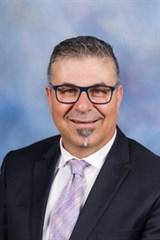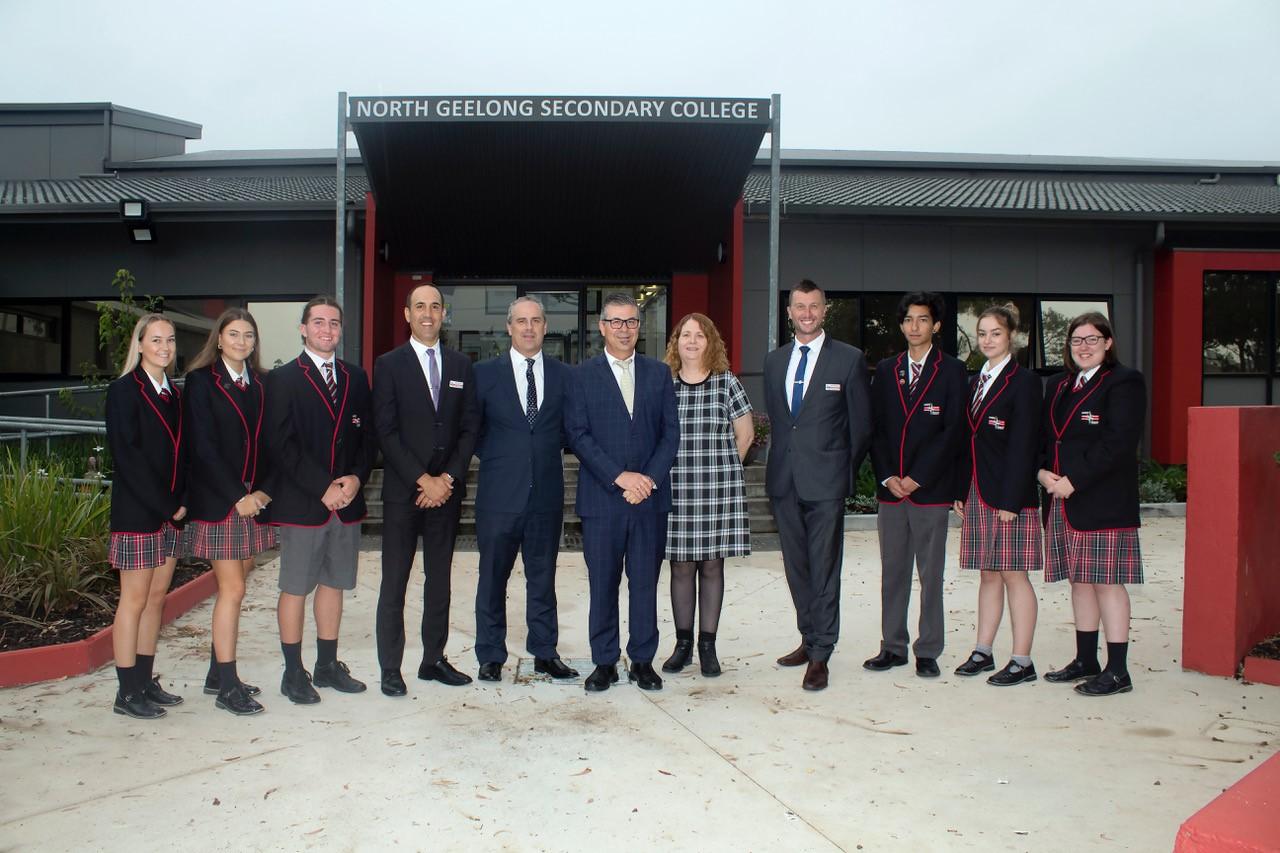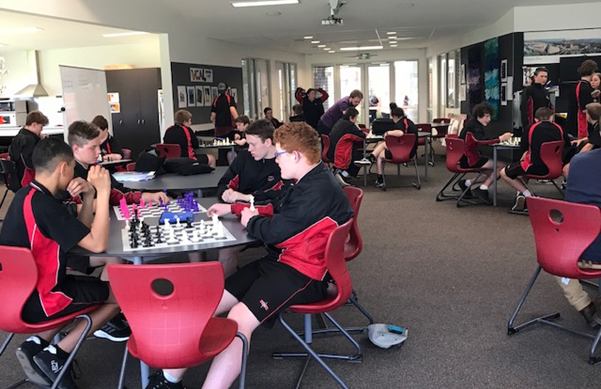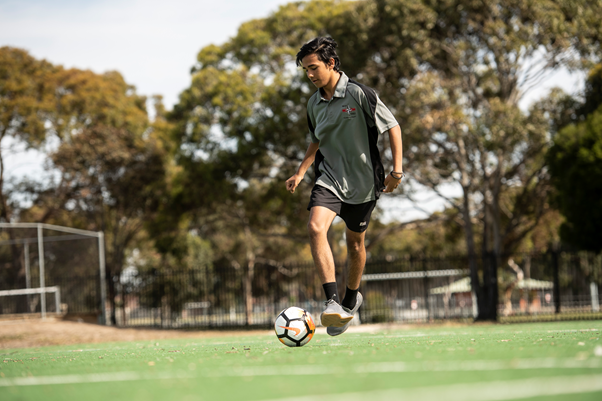PRINCIPAL'S REPORT
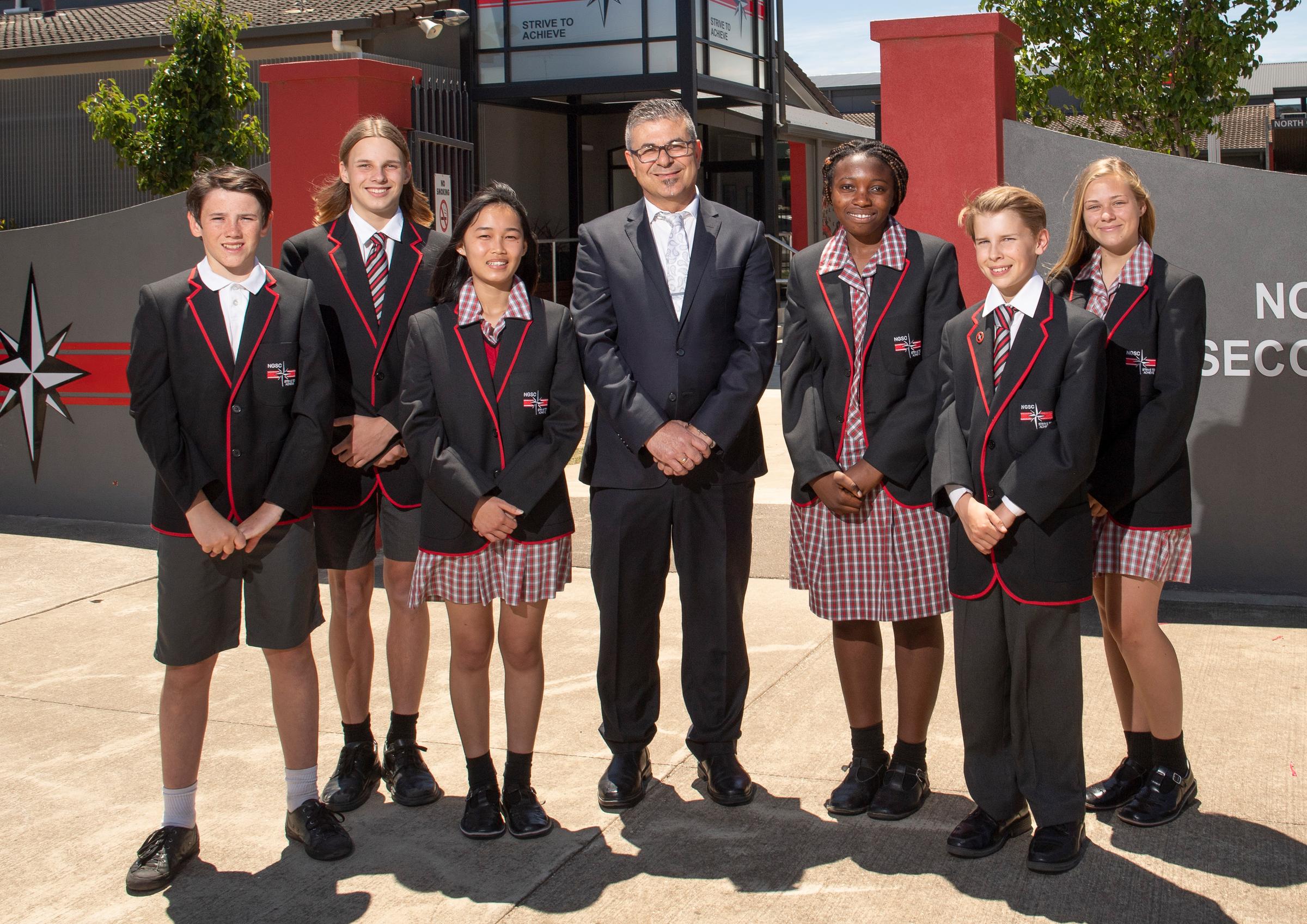
Key Dates
| 8 June | Queen's Birthday Public Holiday |
| (Student Free Day) | |
| 9 June | Return to On-site Schooling |
| Years 7 - 10 | |
| 9 June | Summative Tasks |
| 10 June | Summative Tasks |
| 11 June | Summative Tasks |
| 12 June | Assessment and Reporting Day |
| (Student Free Day) | |
| 15 June | Semester 2 Commences |
| 26 June | End Term Two, 1:30 pm finish |
| 26 June | Semester 1 Reports Published |
Mr Nicholas Adamou
Principal
Term Two in 2020 has been like no other school term in Victoria’s history, and I join with you in celebrating the first stage of students returning on-site and school communities coming together again.
As of Tuesday, 9 June, we will welcome back the rest of the year levels to face-to-face learning. This is part of the second stage of our return to on-site schooling.
I take this opportunity to acknowledge the extraordinary effort the NGSC teaching and non-teaching staff have made, to continue delivering high quality education for students through the transition to, and delivery of, remote and flexible learning.
There were many innovative and creative approaches adopted by our staff during remote and flexible learning and many teachers have brought new approaches with them to on-site schooling.
During the Remote and Flexible learning period many stronger relationships and partnerships were forged between families and teachers, gaining a greater mutual appreciation of their shared contributions to the education of their children and students.
The return to on-site schooling is also a significant transition. Of course, students and school staff are not returning to a standard school environment. NGSC is working closely with The Department of Education and adheres to the Victorian Chief Health Officer’s advice and guidance on re-establishing on-site school education in a way that protects the health and safety of students and staff.
The school’s highest priority is to continue to support our students, parents and staff throughout the process of returning to on-site learning.
In light of resuming face-to-face schooling the following operational guidelines will be in place to minimise risks, ensuring the safety of all students and staff.
Hygiene
- All students will be encouraged to regularly wash their hands - not just after toilet breaks, but also at the beginning and end of recess and lunch breaks
- Soap and hand sanitiser will be available in all student bathrooms
- Students are encouraged to bring and use their own hand sanitiser, however, hand sanitiser will be available in all classrooms at the teacher’s desk
- Hand sanitiser, disinfectant spray (Glen 20), wipes and gloves, will be available in all staffrooms and offices
- Supplementary cleaning of taps, door handles, communally used surfaces, bathrooms and high use areas will be carried out during the school day. This will be undertaken by our Cleaning Services and is additional to the normal cleaning. Cleaners will be on-site all day
- If any confirmed cases of Covid-19 are identified amongst the student or staff cohorts at the school, those persons will be isolated immediately and the relevant authorities notified as soon as possible. The school will be locked-down at the end of that school day for deep cleaning. It will not re-open until declared “safe” by the authorities
Health checks
- There will be temperature checks for unwell students, using a laser thermometer
- Staff will be encouraged to have their temperature-checked on a daily basis
- Staff who seek a health check will be supported in accessing tests
- Staff will be regularly reminded that if they are feeling unwell with flu-like symptoms, even mild symptoms, they should seek a health check if they are at school when they begin to feel unwell. If at home and feeling unwell, they should not attend school. Education staff are entitled to priority health checks if they experience symptoms
- If the school First Aid Officer, declares a child “ill” following a presentation during the day, the child’s parents will be notified immediately and the child will be sent home ASAP. The child will be isolated until they are collected.
Operations & Return Details
- Parents and carers need to be mindful of social distancing when dropping-off and picking-up children. No parents will be allowed on the school grounds before, during and after the school day. In the event that parents need to access the office in person, no more than one parent will be allowed to be in the school foyer at any time
- Students who elect to remain at home when expected to be at school will not be supported with remote learning, unless there are unique circumstances
- There will be no assembly-type gatherings until further notice
- There will be no large staff gatherings until further notice
- There will be no inter-school sport until further notice
- There will be no camps and excursions until further notice.
Social Distancing
All staff will be responsible for their own social distancing and out-of-classroom social distancing, wherever students congregate.
- In the classroom it will be the responsibility of the teacher to implement social distancing as much as the classroom environment permits
- Students will be encouraged to follow social distancing rules in high usage areas such as; locker bays, corridors and canteen
PPE (Personal Protective Equipment)
- Staff will be encouraged to wear facial protection
- Disposable gloves will be worn where appropriate and will be provided to staff
- Students who bring personal protective equipment from home will be encouraged to make use of it
Students
- Students are strongly encouraged not to use taps for drinking. They are encouraged to bring their own water bottles from home for refilling from non-drinking taps
- Students should be observing social-distancing of 1.5 metres as much as possible
Once again, thank you for your continued support and patience during this time. We look forward to welcoming our Year 7 to 10 students back to the classroom.
Child Safe Standards: Creating a safe environment
North Geelong Secondary College is a child safe school/organisation that aims to comply with Ministerial Order No. 870 - Child Safe Standards, which came into effect on 1 August, 2016.
The school is committed to the safety and wellbeing of all children and young people and this is the primary focus of our care and decision-making. We have a zero tolerance for child abuse.
NGSC is committed to providing a child safe environment where children and young people are safe and feel safe, and their voices are heard about decisions that affect their lives. Particular attention is paid to the cultural safety of Aboriginal children and children from culturally and/or linguistically diverse backgrounds, as well as the safety of children with a disability.
Every person involved in NGSC has a responsibility to understand the important and specific role he/she plays individually and collectively to ensure that the wellbeing and safety of all children and young people is at the forefront of all they do and every decision they make.
In addition, the school has a Wellbeing Centre with a number of fulltime staff members working with the students, ensuring they are building resilience skills and having their wellbeing needs addressed. Together, with the Doctors in Schools Program the School Wellbeing Team work with a number of external agencies and organisations utilising their expertise to improving our students’ wellbeing, ensuring they feel safe and able to be productive in a caring learning and teaching environment.
Child Safety, Code of Conduct
NGSC is committed to the safety and wellbeing of children and young people. Our school community recognises the importance of, and the responsibility for, ensuring our school is a safe, supportive and enriching environment which respects and fosters the dignity and self-esteem of children and young people, and enables them to thrive in their learning and development.
This Code of Conduct aims to protect children and reduce any opportunities for child abuse or harm to occur. It also assists in understanding how to avoid or better manage risky behaviours and situations. It is intended to complement child protection legislation, Department policy, school policies and procedures and professional standards, codes or ethics as these apply to staff and other personnel.
The NGSC Principal, together with the school leaders, support the implementation and monitoring of the Code of Conduct, and have planned, implemented and continuously monitor arrangements to provide inclusive, safe and orderly schools and other learning environments.
All staff, contractors, volunteers and any other member of the school community involved in child-related work are required to comply with the Code of Conduct by observing expectations for appropriate behaviour. The Code of Conduct applies in all school situations, including school camps and in the use of digital technology and social media.
Acceptable Behaviours
Staff, volunteers, contractors and any other member of the school community involved in child-related work are responsible for supporting and promoting the safety of children by:
- upholding the school’s Statement of Commitment to child safety at all times and adhering to the school’s child safe policy
- treating students and families in the school community with respect, both within the school environment and outside the school environment, as part of normal social and community activities
- listening and responding to the views and concerns of students, particularly if they are telling you that they, or another child, has been abused or that they are worried about their safety or the safety of another child
- promoting the cultural safety, participation and empowerment of Aboriginal and Torres Strait Islander students
- promoting the cultural safety, participation and empowerment of students with culturally and or linguistically diverse backgrounds
- promoting the safety, participation and empowerment of students with a disability
- reporting any allegations of child abuse or other child safety concerns to the school’s leadership
- understanding and complying with all reporting or disclosure obligations including mandatory reporting as they relate to protecting children from harm or abuse
- if child abuse is suspected, ensuring as quickly as possible that the student(s) are safe and protected from harm
Unacceptable Behaviours
As staff, volunteers, contractors, and any other member of the school community involved in child-related work we must not:
- ignore or disregard any concerns, suspicions or disclosures of child abuse
- develop a relationship with any student that could be seen as favouritism or amount to ‘grooming’ behaviour, for example, offering gifts
- exhibit behaviours or engage in activities with students which may be interpreted as abusive and not justified by the educational, therapeutic, or service delivery context
- ignore behaviours by other adults towards students when they appear to be overly familiar or inappropriate
- discuss content of an intimate nature or use sexual innuendo with students, except where it occurs relevantly in the context of parental guidance, delivering the education curriculum or a therapeutic setting
- treat a child unfavourably because of their disability, age, gender, race, culture, vulnerability, sexuality or ethnicity
- communicate directly with a student through personal or private contact channels (including by social media, email, instant messaging, texting etc) except where that communication is reasonable in all the circumstances, related to school work or extra-curricular activities or where there is a safety concern or other urgent matter
- photograph or video a child in a school environment except in accordance with school policy or where required for duty of care purposes
- in the school environment or at other school events where students are present, consume alcohol contrary to school policy or take illicit drugs
Ways Parents/Carers Can Encourage and Support Mental Health and Wellbeing:
1. Encourage staying connected
Social relationships are important to your young person’s general wellbeing. It is okay if they take time out for themselves at times but encourage them to keep in contact with friends.
Friends can provide both play and support, and spending time with friends is also important for keeping and building on existing friendships. During restrictions, young people can remain connected via phone call, email, text message Facebook message, Zoom meetings or HouseParty app.
2. Encourage involvement
Encourage involvement with volunteer work, hobbies, clubs or committees, or sports. These can help young people feel connected to their wider community. Participate with them when you can. Involve them in decisions and give them responsibility at home (eg making decisions about dinner and helping to prepare dinner). Help them to identify and set realistic goals. Setting and achieving realistic goals can be incredibly motivating and can help build self-confidence.
3. Encourage physical activity
Physical activity is important for everyone’s health and wellbeing. If your young person is feeling down or finding things are difficult, physical activity may be the last thing they feel like doing. But even small activities, like walking around the block, can help relieve stress and frustration, provide a good distraction from worrying thoughts, improve concentration and improve mood. If your young person is struggling to get active, find a physical activity that you both enjoy and can do together and plan to do it regularly.
4. Encourage a regular routine
Getting a good night’s sleep helps young people to feel energised, focused and motivated. Adolescence is a time when a number of changes to the “body clock” impact on sleeping patterns and young people are more likely to have problems with sleep. Developing a sleeping routine can help. Encourage your young person to wake up around the same time each day, get out of bed when they wake up, and go to bed around the same time each night. Avoiding caffeine after lunchtime, having a quiet, dark and uncluttered bedroom and shutting down electronic devices before bed can also help them to get a good night’s sleep.
5. Encourage healthy eating habits
Eating well doesn’t only reduce the risk of physical health problems, like heart disease and diabetes, but it can also help with sleeping patterns, energy levels, mood, and general health and wellbeing. A good balanced diet with less junk food/lots of sugars and more vegetables, fruit, whole grains and plenty of water will ensure your young person has all of the vitamins and minerals to help their body and brain function well.
6. Encourage play
Devoting time to just having fun can help to recharge your young person’s battery, revitalise their social networks and reduce stress and anxiety.
Closer To The End Of The First Semester
Please note that as we move closer to the conclusion of second term and the end of Semester One, the following will be occurring.
- Semester Reports are currently being prepared and will be posted on-line by the middle of June, (beginning of Semester Two)
- Teachers will be finalising assessment and reporting on Friday, June 12. This is a student free day; No remote classes will be conducted and no students will be required at school on this day
Following the posting of semester reports, parents will have the opportunity to contact teachers on a needs basis to discuss progress and planning for the second half of the year. Some of the parents have already come in contact with school key stakeholders, such as; Home Group Teachers, Sub School Leaders, Careers Team, Year level Coordinators, Wellbeing Officers and Principal Class Officers in relation to planning and setting goals for Semester Two.
Picking Up and Dropping Off Children Around Schools; Reminder For Parents And Carers
For the safety of children, parents/guardians are reminded and strongly encouraged to take care and obey parking signs when picking up or dropping off children around the school. Council’s Parking and Information Officers regularly patrol school areas during start and finish times and motorists detected breaching parking regulations risk being issued with a Penalty Infringement Notice.
Remember, as soon as you stop to let your children in or out of the car, you are deemed to be parked. You do not have to leave your car or turn the engine off to receive a fine.
At children’s crossings, you must remain stationary at the stop line while any person (including an adult or the supervisor) is on the crossing or the stop sign is displayed. Do not let your child out at this time; ensure that they wait until you are safely and legally parked.
If you breach a parking regulation the parking and information officer assigned to monitor our school crossing will usually record your registration number and details, and the Penalty Infringement Notice will be posted to the registered owner of the vehicle within the next three days.
Also dropping off or picking up children in the staff car park is prohibited and no parents/guardians should be parking in the staff car park at any point in time. This behaviour places our students at great risks as they are walking to school or riding their bicycles through the car park.
Please ensure you adhere to the parking regulations around schools and the school’s expectations, so that all children are safe and you avoid running the risk of a Parking Infringement.
Semester Two Begins 15 June
Semester 2, timetable begins on Monday, 15 June.

